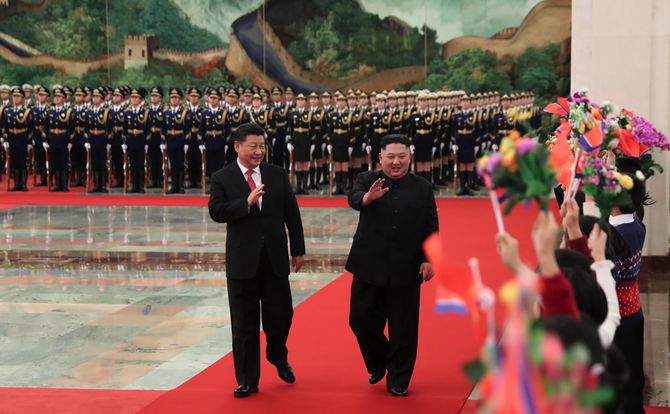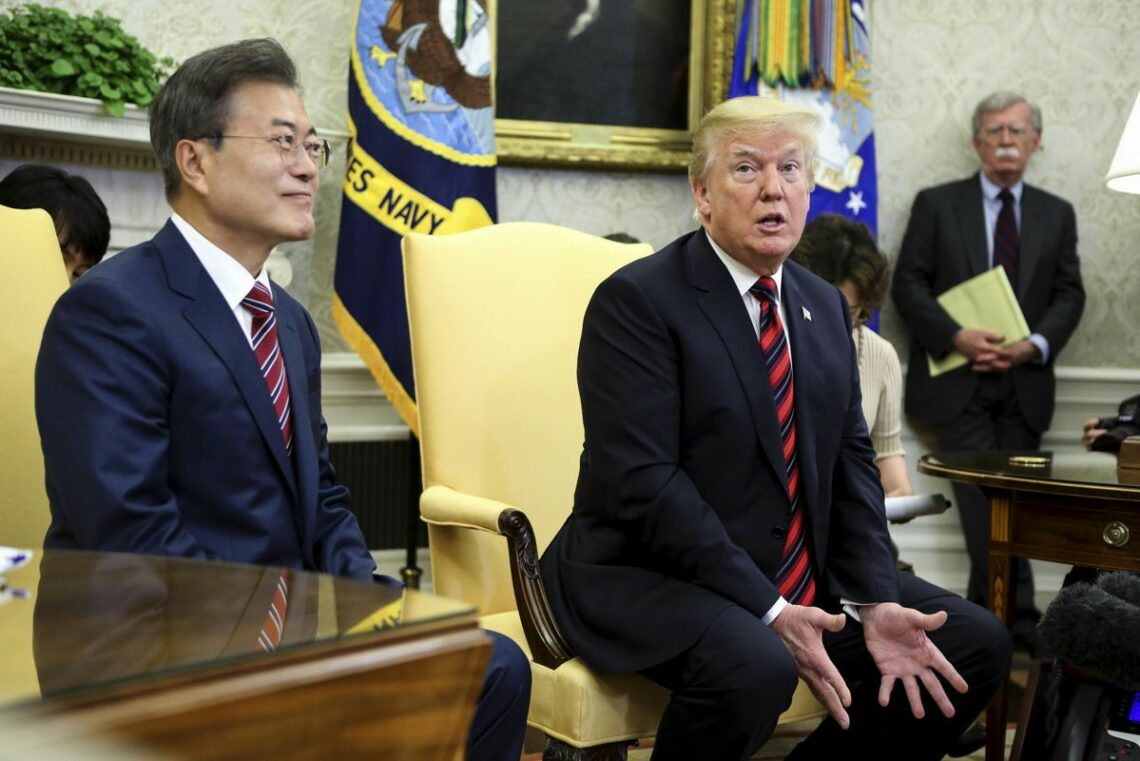2019 Global Outlook: Playing for high stakes in North Korea
Less than a year after the Korean Peninsula appeared poised for war, little on the ground has changed. Pyongyang appears to be forging ahead with its nuclear program. Yet the public perception is that things are moving ahead on the diplomatic front, and there is a whiff of détente in the air.

In a nutshell
- North Korea’s nuclear capabilities are undiminished before another Kim-Trump summit
- South Korean President Moon Jae-in is working quietly to improve ties with Pyongyang
- China’s Xi Jinping is under pressure to ease tensions with the U.S. without appearing weak
In the spring of 2018, events were building toward a military conflict on the Korean Peninsula. Then President Donald Trump and the adversary he dubbed “rocket man” – North Korean leader Kim Jong-un – met in Singapore for what was billed as a high-stakes summit, and the clouds of war over East Asia seemed to lift. Even with the benefit of hindsight, it is nearly impossible to distinguish between what constituted a real threat and what was mostly bluster and playacting. That makes it even trickier to predict what to expect in 2019.
It is human nature to think that one lives in the most turbulent of times. Last year ended on a high note of unpredictability and manifold crises, of which East Asia had its fair share. Yet over the course of 2018, particularly after the Trump-Kim summit in May, North Korea gradually disappeared from the international headlines. This does not mean, however, that one of the most intricate geopolitical problems in the world has gone away.
On the brink
Last spring, the news coming from the Korean Peninsula was so alarming that the Japanese government felt compelled to warn its citizens living in South Korea to be ready for a sudden evacuation. Tokyo braced itself for further violations of Japanese airspace by North Korean rockets. In the United States, national security officials weighed the advisability of evacuating the families of troops stationed in South Korea. Pyongyang thrived in its usual game of one-upmanship and bellicose rhetoric.
A year later, very little on the ground has changed. Recent reports indicate that North Korea is forging ahead with its program to develop long-range rockets with nuclear warheads. Yet there is a clear public perception that some things are moving on the diplomatic front, and that there is even a whiff of detente in the air. More than once in relations between the two Koreas and their sponsors, such expectations have turned out to be wishful thinking. When dealing with Pyongyang, things have a way of changing spectacularly and unexpectedly.
China and the U.S. are using the North Korean issue to help shape their complex trade and security relationship.
Another bilateral summit between Mr. Kim and President Trump, possibly in Vietnam, is reportedly being discussed. Most importantly, South Korean President Moon Jae-in has skillfully used the past few months to reduce tensions and enhance confidence-building measures between the two Koreas. While Mr. Kim and Mr. Trump posture on the grand stage, Mr. Moon has been diligently working to improve relations with the North, knowing full well that any conflict on the peninsula would inflict the greatest devastation on South Korea and its capital, Seoul, which is within easy range of hundreds of North Korea artillery and rocket batteries across the Demilitarized Zone.
Risks aplenty
The four main players in East Asia are Chinese President Xi Jinping, Donald Trump, Kim Jong-un and Moon Jae-in. Japanese Prime Minister Shinzo Abe and Russian President Vladimir Putin have important supporting roles.
For Mr. Xi and Mr. Trump, the Korean issue is closely linked with Sino-American relations, which have lately been prone to numerous risks and uncertainties. Both leaders have a lot at stake and are using the North Korean issue to help shape the complex trade and security relationship between the world’s two most powerful nations. President Trump has repeatedly praised President Xi in the Korean context, while now and then throwing new spanners into the bilateral trade talks.

North Korea is the world’s most secretive country, preventing outsiders from gaining insights into its internal politics. Even U.S. intelligence services have repeatedly erred in analyzing events in North Korea. Even so, one thing seems clear. Until now, Kim Jong-un has made substantial gains from his high-profile interactions with President Trump. He is the first member of the Kim dynasty who can claim to have met on equal terms with the President of the United States, the leader of the most powerful country on earth. Since Mr. Kim, at 35 years of age, is still very young, this diplomatic success counts for a lot. It most certainly has strengthened his dynastic legitimacy.
Although United Nations trade sanctions against North Korea have not been lifted, it is evident that they have been severely weakened. China and Russia are pressing for the sanctions regime to be relaxed, and have themselves been at best selective in its implementation. This allows Mr. Kim to claim that his overtures to Washington have eased economic pressure, without Pyongyang having to make any substantial concessions in its missile and nuclear programs.
Dim prospects
Preparations for a second Kim-Trump summit seem to be well underway. The date and the location are not yet known, but President Trump seems eager for the meeting to occur – and soon. U.S. intelligence agencies and senior White House advisers have repeatedly told the president that they see no evidence of North Korea scaling back its missile and nuclear capabilities. Visits by Secretary of State Mike Pompeo to Pyongyang have yielded no tangible results. Every so often, the North Korean authorities have reverted to their traditional warlike rhetoric. All this suggests that the prospects for significant progress in 2019 toward denuclearizing North Korea are very dim indeed.
While China’s leverage over North Korea is far from total, its influence is significant and could be constructive.
Any plausible scenario for Korea must consider the specific interests of President Xi Jinping. The Chinese leader finds himself in a rather complicated situation – partly due to the Trump administration’s China policy, and partly of his own making. Bilateral relations with the U.S. are without doubt uppermost in Mr. Xi’s mind. During the past few years, Beijing has been rather rash in projecting economic and military power near and far from its borders. At the same time, with the elevation of Donald Trump to the presidency, U.S. policies toward China, particularly in the trade field, have hardened. It is fair to say that never in the past four decades have there been greater strains between the two countries. Tensions are unlikely to ease in the foreseeable future.
President Xi is playing for high stakes. He may look powerful, having claimed for himself the leading posts in party and state, while allowing no visible opponents or designated successors. Nevertheless, his political fate depends on fulfilling his “mandate of heaven” – i.e., assuring strong economic growth and respect for China around the world. If the Chinese president is seen compromising the country’s power and prestige, he will not last long. Delivering on this promise of prosperity and recognition of China’s new superpower status will be uppermost in Mr. Xi’s dealings with Washington. And here Beijing may have a Korean card to play.
The U.S. has very little to show thus far from its Korea policy, even though President Trump is touting the diplomatic thaw as one of his significant achievements. Mr. Xi is very much aware of this. While China’s leverage over North Korea is far from total, its influence is significant and could be constructive. Without cooperation from the Chinese, nothing will move in bilateral relations between Washington and Pyongyang. At a minimum, Beijing could prevent another one of those abrupt breakdowns and turnarounds for which North Korea’s Kim dynasty has been so famous in the past.








